Shakespeare's Garden of Girls : a Study. By the Author
of "Lady Macbeth." (Remington and Co.)—This book, which is tastefully got up, and dedicated to Miss Anderson, may be safely recommended to -all lovers of Shakespeare. It consists of twenty-one short sketches, nineteen of which are devoted to single heroines, while the two last gather up the " waiting-women " and "country girls" of the great dramatist, chiefly to show that no two, even of his secondary personages, are exactly alike. "Shakespeare," says the authoress in her introduction, "was the first to create real women in poetry. Spenser's ` Una ' was a myth ; but 'Juliet,' ' Imogen,"Desde- mona," Ophelia," Rosalind,' and the rest, are women we know. They have their counterparts all round Us." Certainly these sketches will go a long way towards bringing home this naturalness, which is the highest- triumph of the poet's art, to those who have hitherto failed to realise it. Here and there the authoress draws a practical lesson from the subject in hand. She takes advan- tage, for instance, of the story of " Imogen," to protest against the opinion, to which novels give too much countenance, that marriage is the end, instead of, as it should be, the real commence- ment of the romance of life. Again, in the sketch of " Desdemona," she enters her protest against "the monstrous doctrine of the essen- tial animalism of the human affections, which is one of the most loudly proclaimed dogmas of modern society." Perhaps the least satisfactory part of this book is the sketch of " Ophelia." The writer seems to us hardly to do the poor daughter of Polonins justice. The explanation of her "vulgarity," on p. 55, strikes us as almost gro- tesque. But it would be ungracious to look too closely for blemishes in a book which is, on the whole, so praiseworthy and appreciative a study of a subject which must interest all who have any poetry or romance in their nature.


































 Previous page
Previous page